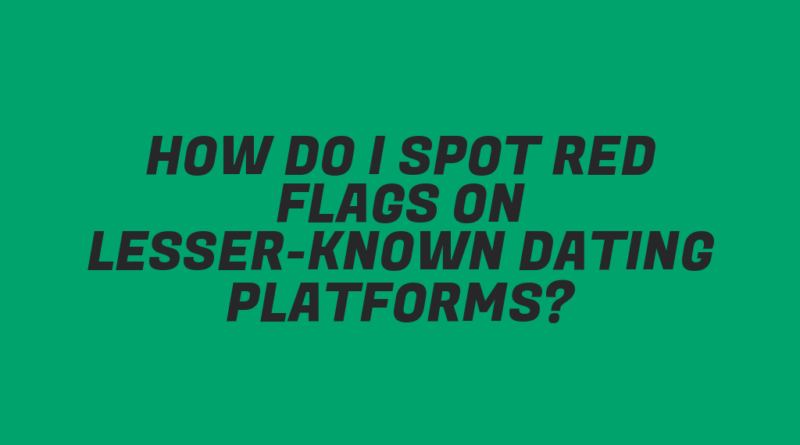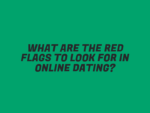How Do I Spot Red Flags on Lesser-Known Dating Platforms?
Navigating lesser-known dating platforms can be exciting but also risky, especially when it comes to spotting red flags. These platforms may not always have the same safeguards and regulations as larger, more established sites, making it essential to recognize warning signs early on. In this article, we’ll explore the top 10 most common questions about identifying red flags on lesser-known dating platforms. By being aware of potential issues, you can protect yourself and ensure a safer, more enjoyable online dating experience.
What Are the Most Common Red Flags on Lesser-Known Dating Sites?
There are several red flags to watch out for when using lesser-known dating sites. Here are some of the most common:
- Requests for Money: One of the biggest red flags is when someone asks for financial help or gifts, especially early on.
- Incomplete Profiles: A profile that is missing key information or seems hastily put together could be a sign that the user isn’t serious or may be a scammer.
- Reluctance to Video Chat: If someone is unwilling to verify their identity through a video call, it’s a warning sign that they may not be who they say they are.
- Inconsistent Communication: If a user’s story doesn’t add up or they avoid answering certain questions, this could be a sign that they’re hiding something.
Spotting these red flags early can help you avoid wasting time or putting yourself at risk.
How Can I Verify Someone’s Identity on a Lesser-Known Dating Platform?
Verifying someone’s identity is crucial when using any dating site, but it’s especially important on lesser-known platforms. Here’s how you can do it:
- Request a Video Call: Suggest having a video chat early on in the conversation to confirm that the person you’re speaking to matches their profile.
- Check Their Social Media: If they have social media profiles, look for consistency in the information they’ve shared on the dating site. Be wary if they refuse to share their social media or if it appears suspiciously inactive.
- Use Reverse Image Search: A reverse image search on their profile photos can help identify whether their pictures are genuine or taken from someone else online.
- Ask Specific Questions: Ask about details from their profile or previous conversations to see if their answers are consistent.
Verifying someone’s identity ensures you’re talking to a real person and not a scammer.
What Are Signs of a Fake Profile?
Fake profiles are common on lesser-known dating sites, and spotting them can save you time and trouble. Here are some telltale signs:
- Too Perfect to Be True: If the profile seems overly polished or the person’s photos look like professional modeling shots, it could be a fake account.
- Quick Professions of Love: A fake profile may try to emotionally manipulate you by expressing strong feelings or love too quickly.
- Poor Grammar or Vague Responses: Often, scammers using fake profiles will have poor grammar or send generic, vague messages that don’t respond directly to your questions.
- Limited Photos and Information: Fake profiles often have only one or two photos and minimal information. The profile might lack personal details like hobbies or interests.
Being aware of these signs can help you steer clear of fake profiles and focus on genuine matches.
Should I Be Concerned About Overly Personal Questions?
Yes, overly personal questions early in a conversation can be a significant red flag. Here’s why:
- Attempts to Extract Sensitive Information: Scammers may try to gather sensitive information like your home address, workplace, or financial details to exploit later.
- Too Forward Too Soon: If someone is asking very personal or intimate questions too early, it could be a sign that they’re not interested in building a genuine connection.
- Pushy Behavior: Watch for anyone who pressures you to share information that you’re not comfortable with. This can be a sign of manipulation.
Staying cautious about the types of questions someone asks can protect you from potential scams or uncomfortable situations.
What Are Red Flags in Communication Patterns?
The way someone communicates on a dating platform can reveal a lot about their intentions. Here are some communication red flags to look out for:
- Inconsistent Responses: If the person’s story keeps changing, or they’re inconsistent with the details they’ve shared, it could be a sign of dishonesty.
- Excessive Flattery: Over-the-top compliments, especially early in the conversation, can be a tactic used by scammers to build trust quickly.
- Avoiding Direct Questions: If the person dodges your questions or gives vague answers, they may be hiding something or not who they claim to be.
- Messages at Odd Hours: Receiving messages at strange times, particularly if they claim to be in a different time zone, could indicate they’re not being truthful about their location.
Being aware of these patterns will help you spot potential red flags and avoid bad actors.
How Can I Protect My Personal Information on Lesser-Known Dating Sites?
Protecting your personal information is essential when using any dating platform, especially those that are less regulated. Here’s how to safeguard your information:
- Use a Separate Email Account: Create a separate email address specifically for dating, and avoid linking it to your primary accounts.
- Limit Personal Details in Your Profile: Avoid sharing information like your full name, home address, phone number, or workplace in your profile.
- Be Wary of Sharing Social Media Accounts: Be cautious about sharing your social media profiles, as they can reveal a lot of personal information.
- Enable Privacy Settings: Use the privacy settings on the dating platform to control who can see your profile and contact you.
These steps will help you keep your personal information safe and reduce the risk of it being exploited.
What Should I Do If Someone Asks for Money?
If someone asks for money on a dating platform, it’s a major red flag. Here’s what to do:
- Say No Immediately: Never send money to someone you’ve met on a dating platform, regardless of their story.
- Report the User: Most dating sites have a feature that allows you to report suspicious behavior. Report the person to the site administrators to protect yourself and others.
- Block Them: If someone asks for money, it’s best to block them immediately to avoid further communication.
- Trust Your Gut: If a request for money feels off or you’re unsure, trust your instincts and cut off communication.
Requests for money are one of the most common scams on dating platforms, so it’s important to act quickly and decisively.
How Can I Spot Red Flags in Their Profile?
The profile itself can reveal a lot about a person’s intentions. Here’s what to watch out for:
- Incomplete Profiles: A profile that lacks details, photos, or thoughtful responses can be a sign that the person isn’t serious or might be hiding something.
- Generic Language: If the profile reads like it could belong to anyone, without specific interests or personality traits, it might be a fake or scam profile.
- Photos That Look Too Good to Be True: Professional-looking photos or pictures that seem like they’re taken from the internet are major red flags.
- No Social Proof: If the person doesn’t link to any social media or has no online presence, it could indicate that the profile is fake or the person is hiding something.
Spotting these red flags in profiles will help you avoid investing time in someone who isn’t genuine.
Should I Trust Someone Who Avoids Meeting in Person?
If someone repeatedly avoids meeting in person, this is a significant red flag. Here’s why:
- Fear of Being Exposed: Scammers and fake profiles often avoid meeting in person because they’re not who they claim to be.
- Excuses Pile Up: If the person constantly has excuses for not meeting in person, it’s a sign that they may not be interested in a real relationship.
- Reluctance to Video Chat: If they also avoid video chatting, it’s likely they’re hiding something, as video calls are an easy way to verify someone’s identity.
Avoiding in-person or video meetings is often a tactic used by scammers to prolong a fake relationship without being exposed.
What Should I Do If I Encounter Red Flags?
If you encounter any red flags, it’s important to act quickly. Here’s what to do:
- Trust Your Instincts: If something feels off, trust your gut. It’s better to be cautious than to ignore warning signs.
- Report the Behavior: Most dating platforms have reporting features. Use these tools to alert the site administrators of suspicious activity.
- Cut Off Communication: If you notice multiple red flags, don’t hesitate to block the person and move on.
- Stay Safe: Always prioritize your safety when interacting online. If you feel unsafe or uncomfortable, take immediate action to protect yourself.
Taking these steps will help you navigate dating platforms with confidence and security.
Dating on lesser-known platforms can be an exciting way to meet new people, but it’s important to stay vigilant for red flags that could indicate scams or bad intentions. By recognizing signs like incomplete profiles, requests for money, and inconsistent communication, you can protect yourself from potential risks. Remember to always verify someone’s identity, safeguard your personal information, and trust your instincts when something doesn’t feel right. With these strategies in mind, you can enjoy a safer and more positive online dating experience.











